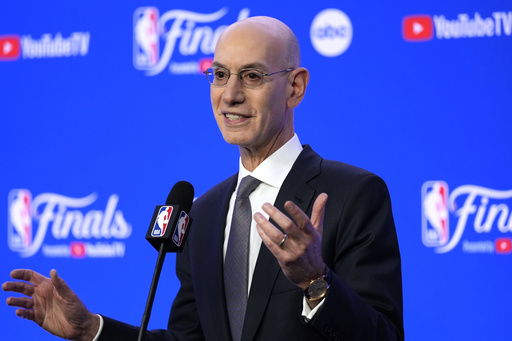
NEW YORK — “Currently, betting on professional sports is illegal in the majority of the United States, with Nevada being a notable exception. I believe this warrants a change in our approach.”
These words, penned by NBA Commissioner Adam Silver on the cusp of the ten-year mark since they were first expressed, symbolize a pivotal moment in sports history. They formed the backbone of a discussion that altered the landscape of professional sports and introduced a previously contentious topic—betting on games—into the mainstream conversation.
Originally featured in an op-ed in The New York Times on November 13, 2014, and printed the following day, Silver’s writing reflects a critical turning point for the NBA. The caption of the piece, “Legalize and Regulate Sports Betting,” marked a stark departure from the league’s prior stance on gambling. Silver aimed to ignite a dialogue about sports betting, and ten years down the line, the NBA now boasts over twenty partnerships with gaming companies.
Today, the conversation surrounding sports betting extends far beyond discussions; it has evolved into a significant social phenomenon.
Reflecting on his earlier advocacy, Silver stated, “I certainly don’t regret pushing for legalized sports betting. I still believe we cannot revert to the past. With the rise of the internet and the accessibility of online sports betting, we had to confront the reality that if we didn’t legalize it, individuals would pursue illegal avenues.”
Though Silver’s piece alone did not transform the gambling scene, it undeniably laid the groundwork for the eventual changes. Nearly four years after the op-ed was published, the U.S. Supreme Court overturned a federal law that prohibited gambling on sports events, thereby allowing states the authority to legalize sports betting at their discretion.
The law in question, known as the Professional and Amateur Sports Protection Act, had been enforced since 1992, restricting state-sanctioned sports gambling with only a few exceptions, rendering Nevada the sole state where single-game bets were permitted.
In the four years following the repeal of PASPA, Americans placed legal wagers totaling approximately $125 billion on sporting events.
Silver expressed support for a national framework for sports betting, emphasizing that the current fragmented state-by-state approach complicates league management. He illustrated ongoing competitive tensions among states, such as New York and New Jersey, which vie for the same audience by adjusting tax rates and regulatory structures.
Additionally, Silver acknowledged the possible drawbacks of sports betting, highlighting concerns like underage betting and the need for vigilance regarding potential gambling problems, especially within the college demographic.
These issues recently resurfaced within the NBA itself. In April, Silver instituted a lifetime ban on Toronto Raptors player Jontay Porter following findings that he leaked confidential information to bettors and wagered on NBA games, including betting against his own team.
Silver condemned Porter’s actions, labeling them as “blatant” and “a cardinal sin.” The investigation was sparked by alerts from “licensed sports betting operators and an organization monitoring the legal betting landscape” regarding unusual gambling patterns tied to Porter’s performance during a game on March 20 against Sacramento. The inquiry unveiled that Porter had divulged his health status to a bettor and that a substantial bet of $80,000 was placed, predicting that Porter wouldn’t achieve his projected performance totals. That bet had the potential to reap $1.1 million.
Despite his assertions of illness, Porter exited the game in less than three minutes, failing to meet any performance benchmarks set by the parlay. The aforementioned $80,000 wager was frozen and not fulfilled, prompting the NBA to initiate an extensive investigation.
“We take these matters very seriously,” Silver remarked. “From the very beginning, we recognized that while sports betting isn’t a colossal revenue stream for our league, the engagement it fosters is significant. It’s a popular activity among fans. I categorize betting as something that should not be criminalized, yet requires stringent regulation. Without proper guidelines, individuals may find themselves in precarious situations, affecting not only themselves but potentially their families and organizations like ours.”
